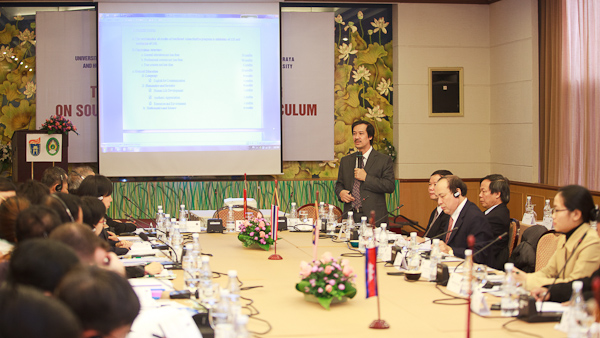On December 16th in Hanoi, the University of Social Sciences and Humanities, in collaboration with Bansomdej Chaopraya University (Thailand), organized an international seminar on developing Southeast Asian Studies as a discipline.The seminar was attended by representatives from 10 universities in Southeast Asia and Vietnam: Bansomdej Chaopraya University (Thailand), National University of Laos, Cambodia International University, Cambodia Polytechnic University, Utara University Malaysia, Tianjin Normal University (China), Guangxi University of Nationalities (China), Hue University of Science, University of Social Sciences and Humanities (Vietnam National University Ho Chi Minh City), and Tay Nguyen University. The seminar primarily focused on developing a Southeast Asian Studies program – a program applicable to many countries and universities in the region. In his opening remarks, Professor Nguyen Van Khanh – Rector of the University – emphasized that, based on the framework program drafted by Bansomdej Chaopraya University and especially based on the results of the two seminars held in March and May in Thailand and Laos, the University of Social Sciences and Humanities (Vietnam National University, Hanoi) has supplemented and adjusted its Southeast Asian Studies program to make it more complete. At this seminar, the University of Social Sciences and Humanities will present adjustments and additions and hopes to receive feedback from representatives of other universities. From there, the universities will discuss and develop a future curriculum framework for Southeast Asian Studies that reflects an international character, is diverse in content, and is suitable for the characteristics of each university, aiming to train an increasing number of high-quality human resources in the field of Southeast Asian Studies.

The original Southeast Asian Studies curriculum, drafted by Bansomdej Chaopraya University, consisted of 132 credits, with general subjects taught in English. However, based on the overall idea of the program being suitable for the general characteristics of Southeast Asia and the specific characteristics of each country, the University of Social Sciences and Humanities adjusted the minimum to 132 credits and the maximum to 141 credits. The 132 credits will be divided between general education and specialized education, with a gap of 9 credits between the minimum and maximum allocated to English language and local language studies, depending on the adjustments made by each country. In addition, the University of Social Sciences and Humanities has made several proposals regarding expert and lecturer exchanges, learning materials, entrance standards, and graduation standards, aiming to create a unified curriculum. Seventeen representatives from universities primarily discussed issues such as: how to align training programs with the practical realities of each country, admission standards, employment, and foreign language learning.

In the current context, developing a Southeast Asian Studies program applicable to multiple countries is essential and highly significant, as it will be a highly internationalized program. Therefore, all universities expressed their desire to participate in more detailed and specific discussions about the future Southeast Asian Studies program. Other opinions suggested that the program should be open and adaptable to each country. They also proposed that the program should focus on foreign languages, student employment prospects after graduation, and compliance with the educational regulations of each country. Furthermore, they suggested strengthening the inclusion of economic and business knowledge to attract a wider audience. Due to time constraints, the delegates agreed that the next discussion would specifically address each issue raised in this session.


